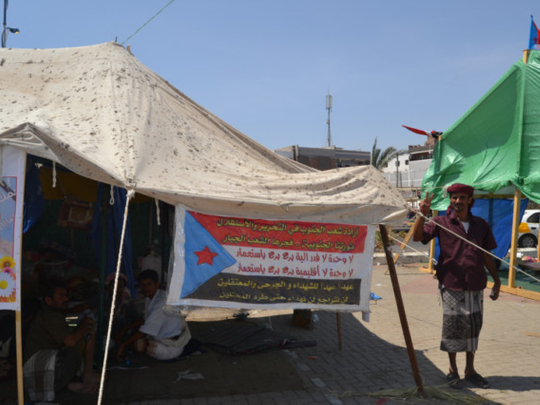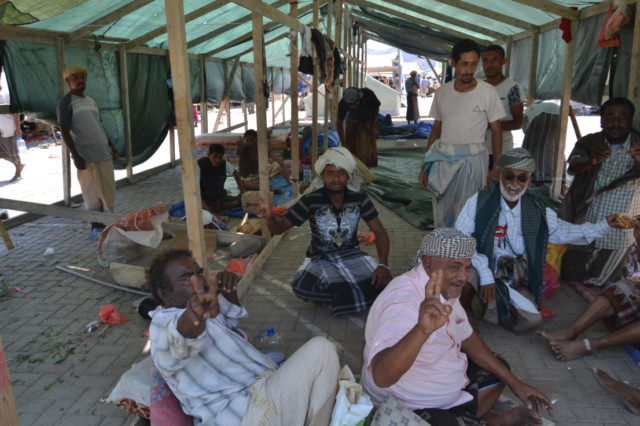
Aden: In central Aden’s densely packed Al Arood Square, stood Saleh Al Huribi, under the burning sun amid tens of thousands of protesters who gathered to demand separation from the north.
“No chance, with the Al Houthis, I want to separate,” said the management student, holding the flag of the former Independent South Yemen.
“After the unification in 1990 it was good, but 1994 onwards, the education, working rights, and freedom in the south, it all went downhill,” referring to the decline in the south’s power and influence, after southern armed forces lost the civil war in 1994 against the north.
Al Huribi’s anguish and frustration resonated in the voices of thousands of men, women and children who chanted “Revolution, Revolution South.”
Protesters who set up their encampments didn’t look like they were going to move until their demands were met.
The rise of Al Houthi militias in Sana’a triggered widespread protests across the south of Yemen. Mass rallies that kicked off in Aden on October 14, the 51st anniversary of the south’s revolt against British rule, spread to nearby provinces of Hodeida, and Mukalla city in Hadramout, last week.
Since 2007, the Southern Movement (Al Hirak Al Janoubi) has been peacefully protesting for equal rights, but their demands were met with deadly force under former President Ali Abdullah Saleh’s regime.
The lack of governance, central government neglect, followed by a debilitating security situation since the Al Houthis usurped Sana’a on September 21, was the final straw.
Federation or secession?
The southerners, for a long time, held on to federalism as an option to secure their autonomy. Dr Walid Al Bakili, is one of them, an Al Hirak supporter since the Al Houthis occupied the capital, “with the Al Houthis here, I don’t want the gun rule,” he said.
“The south is modern, educated unlike the north who are controlled by tribal factions, without education,” said the paediatrician and family physician from Aden.
This year, in February, a presidential panel agreed to transform Yemen into a six-region federation as part of its political transition. A day later, the plan was rejected by the rebels who said the proposed division of the republic did not distribute wealth evenly.
Of a similar view to Al Bakili, is Al Huribi, who snubbed the idea of federalism saying, “Six autonomous regions will not work. We don’t need the north even if we don’t have the resources now. We have to start building from zero.”
A recent report by Aden-based think tank, Abaad Studies and Research Centre, titled “Safe Separation is hard to be achieved in the short-term…”, released on October 14, pointed to several risks if the country opted for division. Some key risks were: non-political ideologies that would give rise to Islamist militancy, and internal conflicts between Al Hirak entities because of their links to Shiite Iran and Ansar Al Sharia, an offshoot of Al Qaida in the Arabian Peninsula (AQAP).
The report also stated that the Al Houthis under the false pretext of protecting the state, would in reality want to control Bab Al Mandeb strait, a key waterway where millions of barrels of oil are transported daily.
But not all Southerners are in favour of secession, with some considering it to be a foolhardy move.
“We don’t have enough resources, administrative power, military support,” said Bilal Gulam Hussain, a historian and writer based in Aden.
“If there is a federation for five to ten years, we can gradually get up to speed and eventually separate,” he added.
Many southerners claim that their land with a majority of the country’s oil, natural gas, fishing and agriculture resources was plundered by the rulers of North Yemen.
“The entire wealth of south was taken by Al Ahmar family and northern rulers,” said Al Bakili.
“The Southern Movement is just one group, but there are 67 other groups fighting for their voice to be heard.”
Moving ahead
Yemen’s southerners have often spoken of their economic and political marginalisation by the central government in Sana’a over the years, claiming unity has been nothing but ink on paper.
Recent reports suggested the Southern Movement has been seeking international support to achieve its goal of splitting from the north.
When asked about AQAP’s role in the separation, London-based Yemen analyst and researcher, University of Exeter, Fernando Carvajal said, ”AQAP’s approach is obviously to control all of Yemen someday.”
“AQAP would initially benefit from secession, as the south is expected to fragment into at least four regions due to internal differences. AQAP remains strong in Hadramout, which wants to become an independent region without Shabwa, or southwest provinces.”
Al Bakili said,”if the war does not stop in the north, the south will surely separate. My hope is for a federal government, which will be good for us all.”
At a dental clinic in Haddah, the nurse treating me is from Hadramout, east of Aden. After living in Sana’a for 20 years, I asked her if the separation would disrupt her family life.
“It’s time we moved on, the north robbed us of our resources,” she said.
— Charlene Anne is a freelance journalist based in Sana’a













